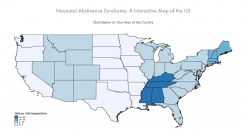News @VU: Surgery for tongue tie shows some benefits; more research needed
May 7, 2015
by Christina Echegaray | Thursday, May. 7, 2015, 10:32 AM
Surgically treating “tongue tie” in infants may be associated with improved breast-feeding and reduced nipple pain, as reported by mothers, but much more research is needed on best practices for treating the condition, according to a newly published systematic review.
Interactive Neonatal Abstinence Syndrome Resources
May 5, 2015
https://medschool.vanderbilt.edu/nas/
NBER: Uncovering Waste in U.S. Healthcare
March 31, 2015
Abstract: There is widespread agreement that the US healthcare system wastes as much as 5% of GDP, yet little consensus on what care is actually unproductive. This partly arises because of the endogeneity of patient choice of treatment location. This paper uses the effective random assignment of patients to ambulance companies to generate comparisons across similar patients treated at different hospitals.
New NEJM Study Co-Authored by Dr. Carlos Grijalva: Respiratory Viruses Cause of Community-Acquired Pneumonia in Children
February 27, 2015
Dr. Carlos Grijalva, MD, MPH, and his colleagues from the multicenter Etiology of Pneumonia in the Community (EPIC) study published their recent findings in the New England Journal of Medicine. They found that respiratory viruses were responsible for 4 out 5 cases of community-acquired pneumonia hospitalizations among children, whereas bacterial infections accounted for fewer than 1 in 10 cases, and a combination of bacterial infections and viruses also accounted for fewer than 1 in 10 cases.
New Study Co-Authored by Bruce Jennings: Forty Years of Work on End-of-Life Care — From Patients' Rights to Systemic Reform
February 12, 2015
More than 2.5 million people die in the United States each year, most of them from progressive health conditions. Facing death is a profound challenge for patients, their relatives and friends, their caregivers, and health care institutions. Nearly 40 years of intensive work to improve care at the end of life has shown that aligning care with patients' needs and preferences in order to ease the dying process is surprisingly difficult — although there has been some incremental progress.
New Study Co-Authored by Dr. John Graves: Measuring Returns to Hospital Care: Evidence from Ambulance Referral Patterns
February 11, 2015
We consider whether hospitals that receive higher payments from Medicare improve patient outcomes, using exogenous variation in ambulance company assignment among patients who live near one another. Using Medicare data from 2002–10 on assignment across ambulance companies and New York State data from 2000–6 on assignment across area boundaries, we find that patients who are brought to higher-cost hospitals achieve better outcomes.








